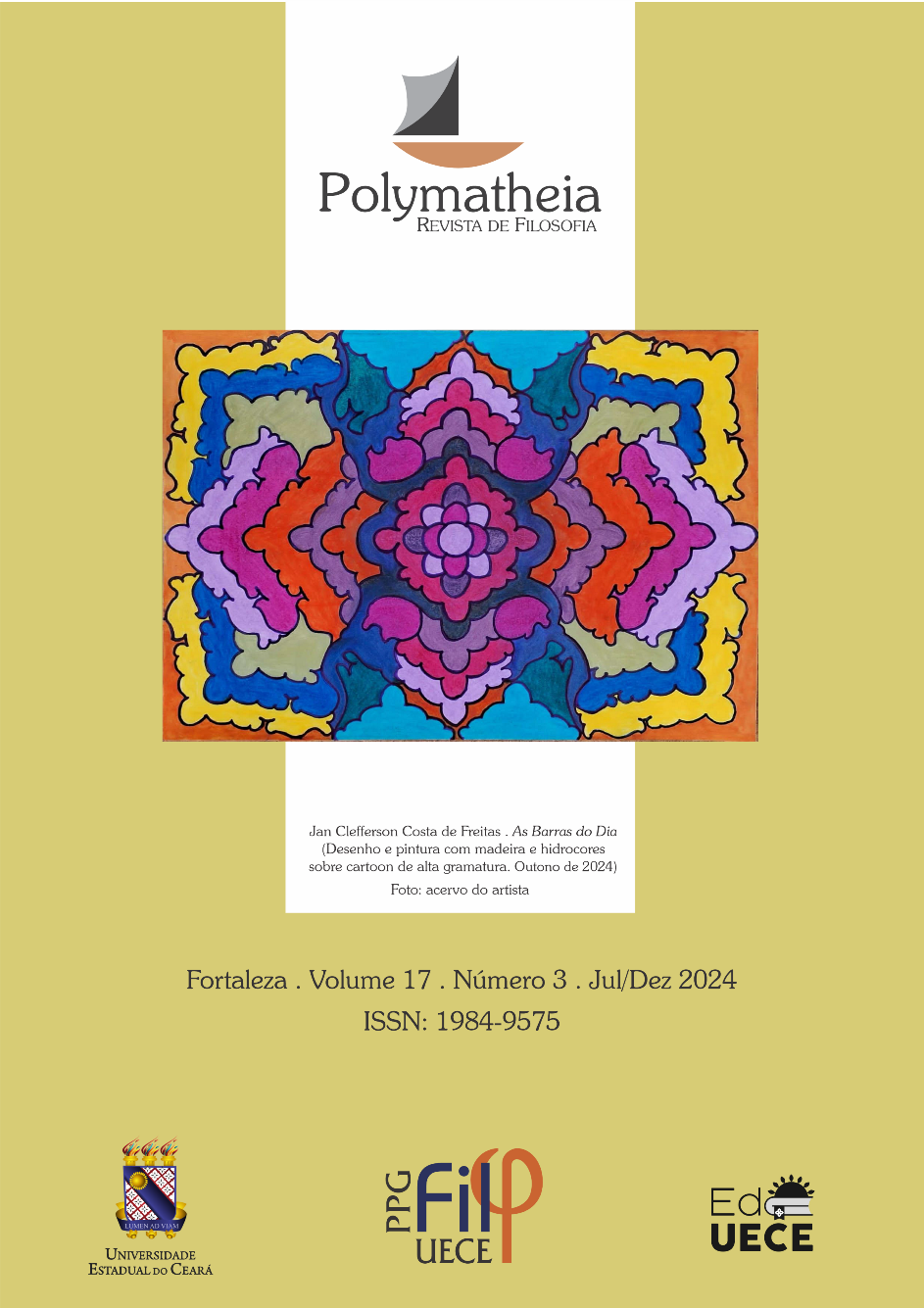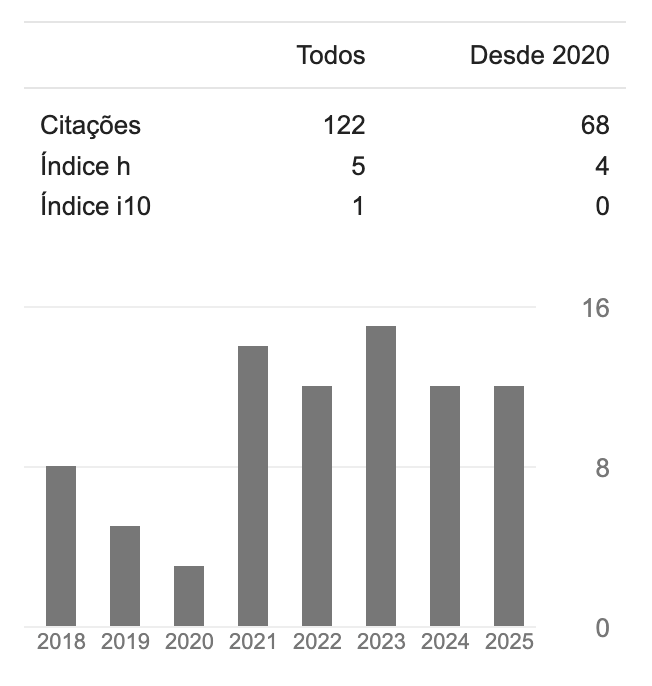JÜRGEN HABERMAS E A CRÍTICA DA RAZÃO INSTRUMENTAL:
DA REIFICAÇÃO AO PODER
DOI:
https://doi.org/10.52521/poly.v17i3.14283Palavras-chave:
Habermas, Teoria Crítica, razão instrumental, ação comunicativa, Dialética do EsclarecimentoResumo
Este artigo apresenta duas críticas de Habermas a Adorno e Horkheimer: a primeira, presente no quarto capítulo de sua Teoria da ação comunicativa (1981); a segunda incluída em O discurso filosófico da modernidade (1985), que apresentam uma mudança na posição de Habermas com relação a esses autores. Em 1981, a crítica da razão instrumental indica o esgotamento do paradigma da filosofia da consciência e a necessidade de um novo para retomar as tarefas da Teoria Crítica. Em 1985, Habermas entende os autores como integrantes de uma crítica radical do esclarecimento, marcando sua ruptura com a crítica marxista da ideologia.
Downloads
Referências
ADORNO, Theodor W.; HORKHEIMER, Max. Dialética do esclarecimento: fragmentos filosóficos, Rio de Janeiro: Jorge Zahar Editora, 2006. Tradução de: Guido Antonio de Almeida.
ALEXANDER, Jeffrey. “Habermas and Critical Theory: beyond the marxian dilemma?” In: HONNETH, Axel; JOAS, Hans (Ed.) Communicative Action: essays on Jürgen Habermas's The Theory of Communicative Action. Cambridge, EUA: The MIT Press, 1991. Tradução de: Jeremy Gaines e Doris L. Jones.
BENHABIB, Seyla. Critique, Norm, and Utopia: a Study of the Foundations of Critical Theory. New York: Columbia University Press, 1986.
BERNSTEIN, Richard J. Praxis and Action: Contemporary Philosophies of Human Activity. Filadélfia: University of Pennsylvania Press, 1999.
BOHRER, Karl Heinz (Ed.) Mythos und Moderne: Begriff und Bild einer Rekonstruktion. Frankfurt am Main: Suhrkamp Verlag, 2015.
D'ENTRÈVES, Maurizio Passerin; BENHABIB, Seyla (Ed.). Habermas and the Unfinished Project of Modernity: Critical Essays on The Philosophical Discourse of Modernity. Cambridge, EUA: The MIT Press, 1997.
DUARTE, Rodrigo. Adorno/Horkheimer & a dialética do esclarecimento. Rio de Janeiro, RJ: Jorge Zahar, 2002.
GAGNEBIN, Jeanne Marie. Sete aulas sobre linguagem, memória e história. Rio de Janeiro, RJ: Imago, 2005.
______________________. Lembrar escrever esquecer. São Paulo, SP: Editora 34, 2009.
GATTI, Lucianno Ferreira. “Theodor W. Adorno: indústria cultural e crítica da cultura”. In: NOBRE, Marcos (Org.) Curso livre de teoria crítica. Campinas: Papirus, 2011.
HABERMAS, Jürgen. “The Entwinement of Myth and Enlightenment: Re-Reading Dialectic of Enlightenment”, New German Critique, Durham, n. 26, p. 13-30, 1982.
_________________. Philosophical-Political Profiles. Cambridge, EUA: The MIT Press, 1983.
_________________. “Modernidade – um projeto inacabado”. In: ARANTES, Otília Beatriz Fiori; ARANTES, Paulo Eduardo. Um ponto cego no projeto moderno de Jürgen Habermas: arquitetura e dimensão estética depois das vanguardas e duas conferências de Jürgen Habermas. São Paulo: Editora Brasiliense, 1992.
_________________. The New Conservatism: Cultural Criticism and the Historians’ Debate, Cambridge, RU: Polity Press, 1994. Tradução de: Shierry Weber Nicholsen.
_________________. O discurso filosófico da modernidade: doze lições. São Paulo: Martins Fontes, 2002. Tradução de: Luiz Sérgio Repa e Rodnei Nascimento.
_________________. A nova obscuridade. São Paulo: Editora UNESP, 2015. Tradução de: Luiz Repa.
_________________. Facticidade e validade. São Paulo: Editora UNESP, 2020. Tradução de: Rúrion Melo e Felipe Gonçalves Silva.
_________________. Teoria da ação comunicativa: volume 1 – racionalidade da ação e racionalização social. São Paulo: Editora UNESP, 2022a. Tradução de: Luiz Repa.
_________________. Teoria da ação comunicativa: volume 2 – para a crítica da razão funcionalista. São Paulo: Editora UNESP, 2022b. Tradução de: Luiz Repa.
HOHENDAHL, Peter U. “The Dialectic of Enlightenment Revisited: Habermas' Critique of the Frankfurt School”, New German Critique, Durham, n. 35, p. 3-26, 1985.
HONNETH, Axel. “Communication and Reconciliation: Habermas’ Critique of Adorno”, Telos, Candor, n. 39, p. 45-61, 1979. Tradução de: Vincent Thomas e David Parent.
______________; JOAS, Hans (Ed.), Communicative Action: Essays on Jürgen Habermas's The Theory of Communicative Action. Cambridge, EUA: The MIT Press, 1991.
HORKHEIMER, Max. Eclipse da razão. São Paulo: Editora Unesp, 2015. Tradução de: Carlos Henrique Pissardo.
INGRAM, David. Habermas e a dialética da razão. Brasília: Editora Universidade de Brasília, 1993. Tradução de: Sérgio Bath.
LUKÁCS, György. História e consciência de classe: estudos de dialética marxista. São Paulo: Martins Fontes, 2003.
McCARTHY, Thomas A. The Critical Theory of Jurgen Habermas. Cambridge, EUA: The MIT Press, 1981.
NIETZSCHE, Friedrich. A genealogia da moral. São Paulo: Moraes, 1991.
NOBRE, Marcos. Lukács e os limites da reificação: um estudo sobre História e Consciência de Classe. São Paulo: Editora 34, 2001.
______________. A teoria crítica. Rio de Janeiro: Jorge Zahar Editor, 2004.
______________. (Org.) Curso livre de teoria critica. Campinas, SP: Papirus, 2011.
OUTHWAITE, William. Habermas: A Critical Introduction. Cambridge, RU: Polity Press, 2009.
SEGATTO, Antonio Ianni; SILVA, Felipe Gonçalves. “Apresentação à edição brasileira”. In: HABERMAS, Jürgen. A nova obscuridade, São Paulo: Editora UNESP, 2015.
WELLMER, Albrecht. The Persistence of Modernity: Essays on Aesthetics, Ethics and Postmodernism. Cambridge, RU: Polity Press, 2007. Tradução de: David Midgley.
WOLIN, Richard. “Introduction”. In: HABERMAS, Jürgen. The New Conservatism: Cultural Criticism and the Historians’ Debate. Cambridge, RU: Polity Press, 1994.
Downloads
Publicado
Como Citar
Edição
Seção
Licença
Copyright (c) 2024 Pedro Pacheco e Zan

Este trabalho está licenciado sob uma licença Creative Commons Attribution 4.0 International License.











